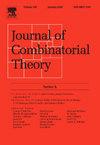最小一般二面群编码等价类的枚举
IF 0.9
2区 数学
Q2 MATHEMATICS
引用次数: 0
摘要
群码是一种线性码,可以作为有限域上的群代数的双面理想来实现。当场的特征是群的阶的素数时,我们将给出群代数中原始中心幂的明确表达式,这使我们能够确定最小群码的等价类数。然后,我们将应用我们的公式计算最小一般二面体群码的等价类数。本文章由计算机程序翻译,如有差异,请以英文原文为准。
The enumeration of equivalent classes of minimal general dihedral group codes
A group code is a linear code which can be realized as a two-sided ideal of a group algebra over a finite field. When the characteristic of the field is prime to the order of the group, we will give explicit expressions for primitive central idempotents in the group algebra, which enables us to determine the number of equivalent classes of minimal group codes. Then, we apply our formula to calculate the number of equivalent classes of minimal general dihedral group codes.
求助全文
通过发布文献求助,成功后即可免费获取论文全文。
去求助
来源期刊
CiteScore
2.90
自引率
9.10%
发文量
94
审稿时长
12 months
期刊介绍:
The Journal of Combinatorial Theory publishes original mathematical research concerned with theoretical and physical aspects of the study of finite and discrete structures in all branches of science. Series A is concerned primarily with structures, designs, and applications of combinatorics and is a valuable tool for mathematicians and computer scientists.

 求助内容:
求助内容: 应助结果提醒方式:
应助结果提醒方式:


